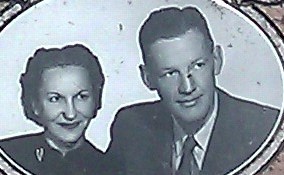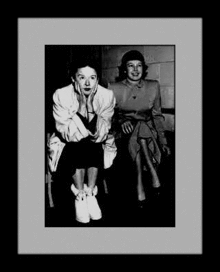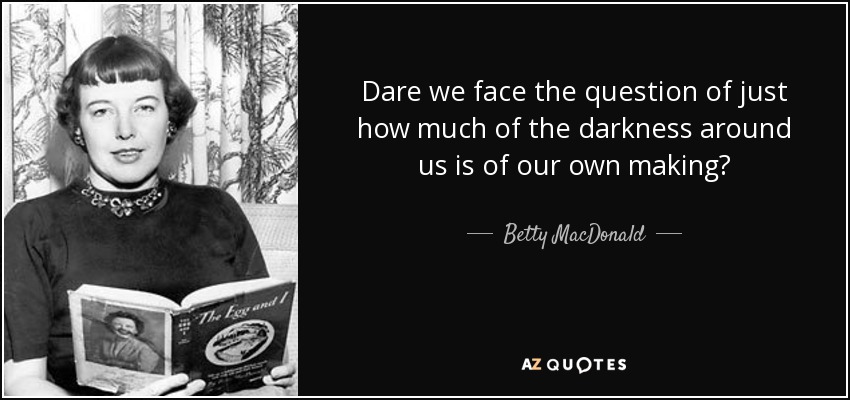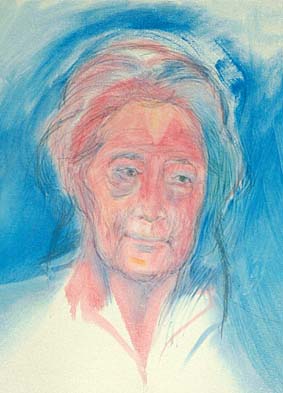






Betty MacDonald's sister Alison Bard Burnett

Betty MacDonald's mother Sydney with grandchild Alison Beck


Betty and Don MacDonald in Hollywood



Alison Bard Burnett - and Betty MacDonald fan club fans,
Betty MacDonald and the colourful season - Autumn or Fall.
That's our new Betty MacDonald fan club contest.
Send us your favourite descriptions of Betty MacDonald about this colourful season, please.
You can find them in Betty MacDonald's books or Betty MacDonald fan club letter collection.
You can win some new Betty MacDonald fan club items.
As already mentioned Wolfgang Hampel and Betty MacDonald fan club research team are working on several new Betty MacDonald fan club items - an updated Betty MacDonald biography and documentary.
Wolfgang Hampel's Vita Magica September was a great event with author Sabine Arndt and tenor Heinz Meisel.
Guys we know you had lots of fun and joy.
Thanks a million dearest Thomas for sharing.
Linde Lund is delighted that Wolfgang Hampel presented one of her favourite songs with his outstanding voice.
Thank you so much dear Wolfgang Hampel!
You made her day!
We are going to publish new Betty MacDonald essays on Betty MacDonald's gardens and nature in Washington State.
Tell us the names of this mysterious couple please and you can win a very new Betty MacDonald documentary.

Betty MacDonald fan club honor member Mr. Tigerli is beloved all over the World.
We are so happy that our 'Casanova' is back.
Don't miss a new breakfast with Brad and Nick, please.
I'd like to visit Betty MacDonald's paradise on Vashon Island.Onions in the Stew is my favourite of Betty MacDonald's brilliant books.
We wish you a joyful Sunday with lots of golden sunshine and lots of unique moments.
All my love,
Inga
All my love,
Inga
Don't miss this very special book, please.
Vita Magica
Betty MacDonald fan club
Betty MacDonald forum
Wolfgang Hampel - Wikipedia ( English )
Wolfgang Hampel - Wikipedia ( English ) - The Egg and I
Wolfgang Hampel - Wikipedia ( German )
Wolfgang Hampel - LinkFang ( German )
Wolfgang Hampel - Memim ( English )
Vashon Island - Wikipedia ( German )
Wolfgang Hampel - Monica Sone - Wikipedia ( English )
Wolfgang Hampel - Ma and Pa Kettle - Wikipedia ( English )
Wolfgang Hampel - Ma and Pa Kettle - Wikipedia ( French )
Wolfgang Hampel - Mrs. Piggle-Wiggle - Wikipedia ( English)
Wolfgang Hampel in Florida State University
Betty MacDonald fan club founder Wolfgang Hampel
Betty MacDonald fan club interviews on CD/DVD
Betty MacDonald fan club items
Betty MacDonald fan club items - comments
Betty MacDonald fan club - The Stove and I
Betty MacDonald fan club groups
Betty MacDonald fan club organizer Linde Lund
Donald Trump lost Monday’s debate. So did Trumpism.
Donald Trump got his start in politics peddling the
idea that Barack Obama was born abroad. He built his successful
Republican primary campaign on a similar form of white identity
politics, married to a deep and hard-line skepticism of immigration.
That’s been his biggest single issue — deriding Mexicans as rapists and
murderers, promising to deport 11 million undocumented immigrants, and
threatening to ban Muslims from entering the country.
At Monday night’s debate, he had the perfect opportunity
to tee off on these racially charged themes. Hillary Clinton had just
fielded a question about “implicit bias” in policing, arguing that
police needed “retraining” to deal with deep-seated psychological
prejudices against African Americans.
Trump had a chance to stand up for “law and order” and
aggrieved white people everywhere, to say that the problem isn’t the
police but the criminals, and that Clinton was kowtowing to politically
correct dogma. But he, remarkably, did the exact opposite. He accused Hillary Clinton of being the real racist, for using the racially coded term “superpredators” more than two decades ago:
I do want to bring up the fact that you were the one that brought up the words superpredator about young black youth. And that's a term that I think was a — it's — it's been horribly met, as you know. I think you've apologized for it. But I think it was a terrible thing to say.
So here was Donald Trump, avowed opponent of political correctness, essentially accusing Hillary Clinton of committing a microaggression.
This is the untold story of the first presidential
debate. Trump entered the room as the defender of a distinct set of
ideas that blame America’s problems on immigrants and multiculturalism.
He walked out a pale imitation of the mainstream, a man with a deeply
racist past trying desperately to cover it up.
Donald Trump lost Monday night’s debate. So did the ideas he stands for.
Trumpism gave up without a fight

The proposal to build a wall and make Mexico pay for it,
the labeling of all Muslims as potential terrorists, the suggestion that
a Mexican-American judge couldn’t hear a case involving Trump because
his heritage would bias him against the magnate — these are the things
that have defined Donald Trump’s candidacy.
Trumpism is a kind of authoritarian populism, one that
blames immigrants and other ethnic and religious minorities for crime
and terrorism. It has a lot in common with the European far right, as well as a fringe American movement called the alt-right.
“Donald Trump,” as one scholar put it, “is the first Republican in modern times to win the party’s presidential nomination on anti-minority sentiments."
Yet you wouldn’t know it from Monday’s debate. Trump
mentioned crimes committed by undocumented immigrants once, but very
briefly. He didn’t talk about the wall or about rounding up and
deporting millions of people. He never mentioned the purported terrorist
threat posed by Muslim immigrants generally and Syrian refugees
specifically. His signature themes, in other words, were just completely
absent from the night.
This wasn’t for lack of opportunity. Late in the debate,
moderator Lester Holt asked Trump “specifically how you would prevent
homegrown attacks by American citizens.” This was a perfect opportunity
for Trump to pivot to the need to screen immigrants better, to prevent
Muslims from “terrorist” countries from entering and committing attacks.
He didn’t do it. Instead, he decided to attack Clinton’s
record on ISIS and tout his bizarro plan to “take the oil” from Iraq.
This disappointed some of his prominent alt-right fans, like Jared
Taylor (the editor of the racist publication American Renaissance):
When Holt asked Trump about the racial component of New
York’s “stop and frisk” policy, Trump did let loose some vintage
Trumpisms about high rates of crime in inner cities, which painted
American cities and minority communities in a wildly inaccurate light.
But he avoided the more obvious racial dog whistles, like
“black-on-black crime.” He argued that stop and frisk wasn’t racial
profiling but actually a kind of gun control program:
HOLT: The argument is that it's a form of racial profiling.
TRUMP: No, the argument is that we have to take the guns away from these people that have them, and they are bad people that shouldn't have them.
The exchange about birtherism is a third good example.
Trump has been dinged, rightly, for being completely incoherent on the
subject. But he also had a weird way of punching back, arguing that it
was Clinton who actually tried to racially “other” Obama by circulating
pictures of him from a visit to Kenya:
I got to watch in preparing for this some of your debates against Barack Obama. You treated him with terrible disrespect. And I watched the way you talk now about how lovely everything is and how wonderful you are. It doesn't work that way. You were after him, you were trying to -- you even sent out, or your campaign sent out, pictures of him in a certain garb, very famous pictures. I don't think you can deny that.
So to sum up: Trump avoided bringing up his most
controversial, and racially charged, comments. He avoided them even when
he had clear opportunities to bring them up, and even accused Clinton
of being racially insensitive.
This is a very different Donald Trump from the one who announced, in his convention speech, that “we cannot afford to be so politically correct anymore.”
A small victory for American democracy

The point here is not that Trump somehow successfully
pivoted away from his long history of racially and religiously charged
comments. No one has forgotten what he’s said.
Rather, it’s that Trump made a decision not to back off
from them during the biggest moment of the general election to date.
Instead of sticking up for his ideas, he just avoided them. He flinched.
This matters.
The Trumpist project, inasmuch as it exists, is about
making nakedly racist and bigoted language part of the American
political mainstream. It depends on breaking down barriers against
openly offensive speech and normalizing the unacceptable, and it’s been
working: Trump remains close to Clinton in most polls.
But his main political challenge is to take ideas that
appealed to his party’s base and make them acceptable to the rest of the
country. If he had given his normal spiel about banning Muslims on
Monday night, and it had been debated like a normal policy proposal, the
once unthinkable idea would creep even further into the mainstream.
That’s how it’s worked with objectively wacky Trump ideas like “take the
oil,” which he now just gets to say without anyone in the audience even
batting an eye.
By opting not to make those arguments on the debate
stage, Trump has given a surprising signal that he believes some of the
racist language that worked in the primaries won’t fly in the general
election.
That’s a problem for him, because Trump’s entire
electoral strategy depends on holding on to his racist base. Trump can’t
move too far away from his core message without dampening the
enthusiasm for him among people who think Latinos are criminals, Muslims
are terrorists, and black people are lazy.
This constituency is, as George Washington University political theorist Samuel Goldman puts it,
“a minority that thinks it's a majority.” It’s too small to guarantee
electoral victories but too big to accept its minority status. Its
members don’t see a need to reach out to minorities and “politically
correct” whites, and they see doing so as a kind of betrayal.
Indeed, you can see this in the reaction of Trump’s supporters in the so-called alt-right movement. As my colleague Tara Golshan
documents, these online racists are furious that Trump didn’t talk
about what had long been his core issues. “He can't win a debate if they
ask basically no questions about terrorism or immigration,” one user at
the alt-right-friendly message board 4chan writes.
Internet trolls, of course, aren’t a huge constituency. But the voters who share their concerns about minorities and immigration are.
While Trump’s campaign has shown that this group can power a victory in
the Republican primary, it may now be exposing the limits of this
group’s influence on American politics writ large.
There are still two more debates and 43 more days in the
election — plenty of time for Trump and his supporters to wreak more
havoc.
For now, though, score one for the basic norms of American democracy and values.
Post-debate poll: Hillary Clinton takes round one
Story highlights
- Poll: 62% say Clinton won, 27% said Trump did
- It's a similar result to Romney topping Obama in four years ago
(CNN)Hillary
Clinton was deemed the winner of Monday night's debate by 62% of voters
who tuned in to watch, while just 27% said they thought Donald Trump
had the better night, according to a CNN/ORC Poll of voters who watched the debate.
That
drubbing is similar to Mitt Romney's dominant performance over
President Barack Obama in the first 2012 presidential debate.
Voters
who watched said Clinton expressed her views more clearly than Trump
and had a better understanding of the issues by a margin of more than
2-to-1. Clinton also was seen as having done a better job addressing
concerns voters might have about her potential presidency by a 57% to
35% margin, and as the stronger leader by a 56% to 39% margin.
The
gap was smaller on which candidate appeared more sincere and authentic,
though still broke in Clinton's favor, with 53% saying she was more
sincere vs. 40% who felt Trump did better on that score. Trump topped
Clinton 56% to 33% as the debater who spent more time attacking their
opponent.
Although
the survey suggested debate watchers were more apt to describe
themselves as Democrats than the overall pool of voters, even
independents who watched deemed Clinton the winner, 54% vs. 33% who
thought Trump did the best job in the debate.
And
the survey suggests Clinton outperformed the expectations of those who
watched. While pre-debate interviews indicated these watchers expected
Clinton to win by a 26-point margin, that grew to 35 points in the
post-debate survey.
About
half in the poll say the debate did not have an effect on their voting
plans, 47% said it didn't make a difference, but those who say they were
moved by it tilted in Clinton's direction, 34% said the debate made
them more apt to vote for Clinton, 18% more likely to back Trump.
On
the issues, voters who watched broadly say Clinton would do a better
job handling foreign policy, 62% to 35%, and most think she would be the
better candidate to handle terrorism, 54% to 43% who prefer Trump. But
on the economy, the split is much closer, with 51% saying they favor
Clinton's approach vs. 47% who prefer Trump.
Most
debate watchers came away from Monday's face-off with doubts about
Trump's ability to handle the presidency. Overall, 55% say they didn't
think Trump would be able to handle the job of president, 43% said they
thought he would. Among political independents who watched the debate,
it's a near-even split, 50% say he can handle it, 49% that he can't.
And
voters who watched were more apt to see Trump's attacks on Clinton as
unfair than they were to see her critiques that way. About two-thirds of
debate viewers, 67%, said Clinton's critiques of Trump were fair, while
just 51% said the same of Trump.
Assessments
of Trump's attacks on Clinton were sharply split by gender, with 58% of
men seeing them as fair compared with 44% of women who watched on
Monday. There was almost no gender divide in perceptions of whether
Clinton's attacks were fair.
The
CNN/ORC post-debate poll includes interviews with 521 registered voters
who watched the September 26 debate. Results among debate-watchers have a
margin of sampling error of plus or minus 4.5 percentage points.
Respondents were originally interviewed as part of a September 23-25
telephone survey of a random sample of Americans, and indicated they
planned to watch the debate and would be willing to be re-interviewed
when it was over.
"New York Times": Trump's "worst candidate in history"
 | |||
Politic News Report:
The "New York Times" has made a recommendation to vote for the
Democratic US presidential candidate Hillary Clinton. Your Republican
challenger Donald Trump described the newspaper as the "worst candidates
to a great party has produced in modern American history."
In an editorial it said, Trump reveal nothing of himself or of his plans
- instead, he promised voters the moon and the stars for gripping.
Recommended Politic News Report: Obama blocked Act lawsuits against Saudi Arabia
At the same time, the newspaper praised Clinton's "intellect, experience
and courage". Today's world fighting against challenges such as war and
terrorism as well as the pressure of globalization. Clinton have
analyzed these problems and the "responses accurately weighed it."
Now the US citizen should not only therefore choose Clinton because the
alternative Trump loud, warned the "New York Times". Instead, the voters
would have to be clear about what problems had confronted the country
and Clinton's abilities weigh to tackle this.
Of voters in the US customary
The newspaper gave its recommendation to vote on shortly before the
first televised debate between Clinton and Trump, held German time early
Tuesday morning. Six weeks before the election are the former foreign
minister and the real estate mogul close together in the polls.
In the US, it is tradition that newspapers proposed concrete
recommendations choice. Thus, the "New York Times" had previously spoken
twice for Barack Obama: at his first candidacy and his re-election.
Most newspapers supported Democratic candidates. Recently she had
recommended in the 50's with a Republican Dwight D. Eisenhower.


Mr. Tigerli in China
Copyright 2016 by Letizia Mancino translation by Mary Holmes All rights reserved
Yes Betty, either or it seems he wanted to fly only with
Singapore Airways.
Boeing or Airbus, it’s just the same
isn’t it? Aren’t they both just fat birds with 500 passengers?
Yes, but Singapore Airlines has the
most beautiful airhostesses: delicate, fine, graceful… Mr. Tigerli had looked forward to the flight
so much!
So the little man was disappointed?
You just can’t imagine how disappointed
he was.
But thank God one of the hostesses was a
pretty Chinese girl. Mr. Tigerli purred loudly but she didn’t hear him because
the purring of the Airbus 380 was even louder.
The poor cat!
You’ve said it Betty. Mr. Tigerli was
in a very bad mood and asked me for a loud speaker.
I’m sure you can get one in 1st
Class.
“”Russian Girl” had even heard you over
the roar of the Niagara Falls” I said to Mr. Tigerli. “You are a very
unfaithful cat. You wanted to get to know Asiatic girls. That’s how it is when
one leaves one’s first love”.
And what did he say to that?
“Men are hunters” was his answer.
Yes, my dear cat, a mouse hunter. And
what else did he say?
Not another word. He behaved as if he
hadn’t heard me.
The Airbus is very loud.
I told him shortly “Don’t trouble
yourself about “Chinese Girl”. There will be enough even prettier girls in
China. Wait till we land in Guilin”.
Did he understand you?
Naturally Mr. Tigerli understood me
immediately. Yes, sweetheart, don’t worry. They will find you something sweet
to eat.
And he?
He was so happy.
No problem going through the immigration
control?
Naturally! Lots of problems. How could I explain to
customs that the cat had come as a tourist to China to buy shoes?
Fur in exchange for shoes…
Don’t be so cynical Betty!
Cat meat in exchange for shoes?
He came through the pass control with
no trouble!


Is this Mr. Tigerli?











 |
Betty MacDonald's Vashon Island is a paradise.
info to: Sandra Lorinda Traci Petr Dana Jana Michaela Rebekah Swiss Charrd Tru John Darsie Darsie Toby Jeanine Carol Justin Lila Daniel Mo Nika Steve Neal Jitka Jitka Tami Pete Laurie Maia Nancy Kelly Pam Mary Jan and all our other friends
www.bettymacdonaldfanclub.blogspot.com/
info to: Sandra Lorinda Traci Petr Dana Jana Michaela Rebekah Swiss Charrd Tru John Darsie Darsie Toby Jeanine Carol Justin Lila Daniel Mo Nika Steve Neal Jitka Jitka Tami Pete Laurie Maia Nancy Kelly Pam Mary Jan and all our other friends
www.bettymacdonaldfanclub.blogspot.com/
Take an illustrated day trip through Washington state’s largest city with artist Candace Rose Rardon.
gadventures.com
Linda White yes,if my health allows.I have a few problems but is something I have always wanted to do,especially as I reread her books.
Unlike · Reply · 1 · August 1 at 6:37pm
Linde Lund Dear Linda I'll keep you posted.
Like · Reply · 1 · August 1 at 6:42pm
Bella Dillon · Friends with Darsie Beck
I still read Mrs Piggle Wiggle books to this day. I love her farm on vashon.
Unlike · Reply · 1 · August 1 at 10:32pm
Lila Taylor Good morning...Linde Lund
Unlike · Reply · 1 · 18 hrs














